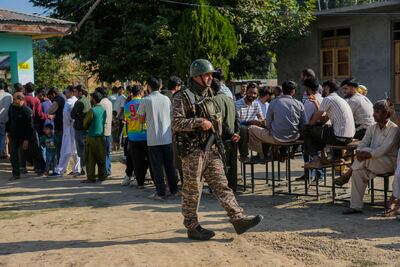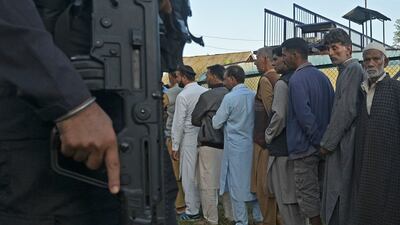Millions of voters in Indian-administered Jammu and Kashmir cast their ballots in the final phase of regional polls on Tuesday after record turnouts in the first two stages.
The region has been without an elected government since 2018, and was brought under federal rule by Prime Minister Narendra Modi’s government a year later. The shock decision stripped the territory of its limited autonomy, downgrading and dividing the former state into the federally administered regions of Jammu, Kashmir and Ladakh.
The three-phase polls for the regional assembly began on September 18 in Jammu and Kashmir, with 61 per cent voter turnout. The second phase was held on September 25 and recorded 54 per cent turnout. Some 3.9 million people were eligible to vote in the final stage. Results will be announced on October 8.
More than 400 candidates have entered the fray for 40 assembly seats – 24 in the mountainous Jammu region and 16 in the Kashmir valley. At least 20,000 polling staff have been mobilised across seven districts.
Pakistani Hindu refugees, who migrated from the former West Pakistan in the wake of partition of the subcontinent in 1947, will also cast ballots for the first time on Tuesday. They won voting rights following the 2019 revocation of the region's special status, under which only natives held voting rights.

The National Conference and the People’s Democratic Party are the major players in the election but dozens of independent candidates are also standing. The National Conference is led by former chief minister Omar Abdullah and has entered an alliance with the Indian National Congress, India's main opposition party. The People’s Democratic Party meanwhile has formed a pact with the country's ruling Bharatiya Janata Party and is led by Mehbooba Mufti, the last chief minister of the former state.
The Muslim-majority region has been in the grip of a decades-long armed rebellion seeking separation from India. The area was divided between India and Pakistan when the subcontinent gained independence from Britain in 1947. Both nations claim it in its entirety. All regional parties have promised to work for the restoration of statehood and special status.
The rebellion against New Delhi has been waged since the late 1980s, with tens of thousands of people, mostly civilians, killed in the conflict and the separatists regularly boycotting elections.
The last poll was held in December 2014 but the elected government stepped down in 2018 when Prime Minister Narendra Modi’s Bharatiya Janata Party pulled out of an alliance with a local party.
The new government will have decision-making powers limited to civic affairs and public administration, with Mr Modi’s government retaining absolute powers over law and order.
A total of 8.7 million voters, comprising about 4.5 million men and 4.2 million women, are registered to vote, according to the Election Commission of India.


